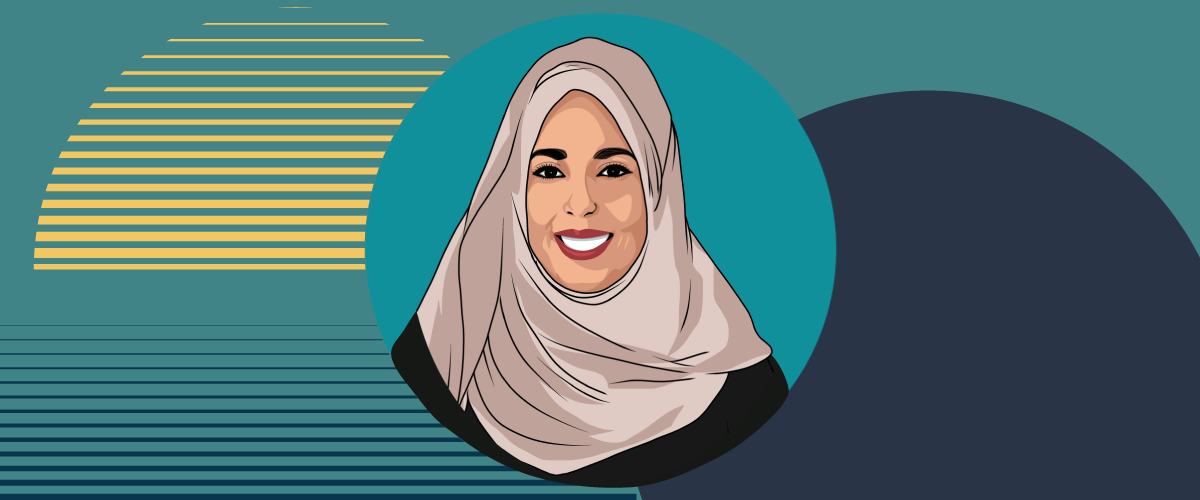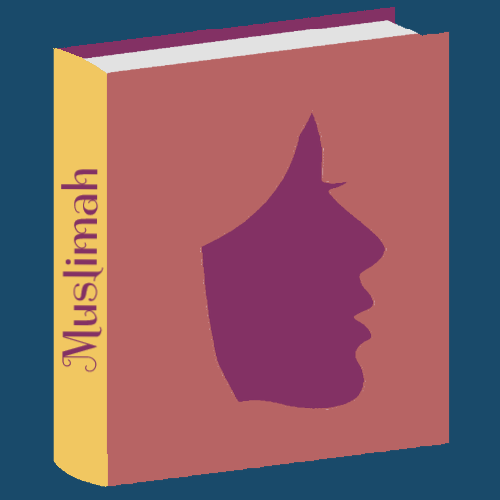
An Artful Journey — Ala’ Al-Thibeh
—by Nasreen Nasreen“We,in the Muslim community, don't look at mental health as being part of our well-being. And when we finally gather the courage to talk about it, there is a lot of stigma that one faces within the community itself.”
A mental-health professional working with newcomers and refugees in Hamilton, Ontario, Ala' Al-Thibeh found early in her career that many immigrants and refugees settling in Canada were struggling with mental health-related issues. Ala', who had always wanted a career where she could help people, realized there was an urgent need for mental health services in the Muslim community. “I feel joy in helping people. I could see the importance of me being Muslim and working in the mental-health field. Once people I worked with knew it was safe to share their experiences with me, they became comfortable and started opening up. I knew it was going to be important for my community. We don't talk about mental health issues, and we don't talk about relationship issues with anyone. But these are things that need to be discussed openly in our community.”
Born in Amman, Jordan, Ala' is Palestinian by descent and is the eldest of seven siblings. Ala' moved to Canada with her family at a very young age. After completing school, she decided to pursue a Bachelor's degree in Religious and Cultural Studies. After graduating, she went on to pursue her Master’s in Theology, Spiritual Care and Psychotherapy from Wilfrid Laurier University.
In her free time, Ala' enjoys engaging in various art forms. She loves to sketch and paint, but usually spends her spare time working with glass, creating mosaics and stained-glass work. Besides that, she likes exploring and learning about sacred geometry, Arabic calligraphy and other traditional forms of art. She also enjoys cross-stitching, which is a traditional form of art connected to her Palestinian roots and culture.
While working towards her Master's degree, there was an influx of Syrian refugees coming into the Kitchener-Waterloo area. As a firm believer in using art as a form of healing and creative expression, Ala' had the pleasure of developing the Healing Through Arts art therapy program with Muslim Social Services in Kitchener, alongside her colleagues. “I use a lot of art in my therapy and practice. I am a believer in using art for expressing yourself, and art is a form of expression that can also be spiritual. You connect spiritually, and you can become more aware of who you are. Art is so important, and that's why I advocate for it.”
Ala’ used art therapy as a primary method while working with refugee children in group settings. Many of these newcomers were impacted by the war and conflict in their home country. Ala’ witnessed the progression they made since arriving in Canada through eight to 12 weeks of participating in the art therapy program. “When I saw the positive impact the therapy had, I wanted to work more closely with the immigrant and refugee population. And that’s what spiked my interest to continue the work that I do.”
Although Ala’ is keen on art today, when she was 18 years’ old she almost dropped her love for the arts. She assumed there was no way of making art into a successful career, and therefore she did not want to pursue it further. Ala’ travelled to Turkey to teach English as a foreign language in 2014. That’s when she saw how much art was appreciated in Turkey and Europe. “It was an enlightening experience for me. I knew I had to stick to art. There is so much more to it than meets the eye. I enrolled in a mosaic class after returning to Canada. I had the opportunity to exhibit some of my artwork at the university where I pursued my Master’s. I was able to exhibit several mosaics and sketches that I made after coming back from Turkey, and there was no looking back after that. I continued to teach myself, and it’s a part of who I am now.” This encouraged Ala’ to submit a letter of interest to The Centre for Addiction and Mental Health (CAMH) when they had a call for submissions for the Therapeutic Art Project completion for the Queen Street Redevelopment Project in Toronto. Ala’ happened to become one of the finalists in this competition and currently has a piece of artwork as part of the Therapeutic Art Project at CAMH.
Ala' continues to travel back and forth from Kitchener to Toronto to attend art exhibitions organized by Muslim women. On her arts discovery journey, Ala' learned about the Coalition of Muslim Women (CMW). “I had this idea of exhibiting the work of immigrant and Muslim women artists in Kitchener. I approached the CMW and sent in a proposal, which they accepted. We applied for two grants and received both for Illuminate KW Arts Project.” Ala’ had the pleasure of coordinating this project alongside Zohra Wali, another member of the CMW and a dear friend.
The Illuminate Arts Project offered art workshops teaching sketching, painting, calligraphy and poetry. The CMW partnered with the Kitchener-Waterloo Art Gallery for the ongoing workshops and THE MUSEUM for a month-long exhibition. The exhibition had around 20 Muslim women artists who participated and had their work displayed. “I had a vision and with the CMW, that vision came to life. I wanted to see Muslim women's art in the spotlight, and we made it happen! The project was meaningful to every woman who participated. In some communities, people tend to focus more on developing other careers, and are often told art means nothing or is not a career that is one should pursue. This is also why it was important to share the talents of Muslim women with everyone.” Ala’ also had the opportunity to present at the Amplify Culture Summit in Waterloo, focusing on the Illuminate Arts Project.
While working on the Illuminate Art project with CMW, Ala' was also interning with the Spiritual Care Department at the Grand River Hospital. She came across cases where individuals had suffered trauma or had other mental health-related issues. She worked with several newcomers who were suffering from mental illness, but were not comfortable sharing their experience or how they felt due to the stigma in the community. This experience made Ala’ want to continue working with the newcomer and immigrant population.
Ala’ went on to do a residency program with St. Joseph Healthcare in Hamilton. While doing her residency, Ala' also decided to enroll in a graduate diploma program in Spiritual Care and Psychotherapy at the Martin Luther University College at Wilfrid Laurier University. She completed her training in the Supervised Pastoral Education Residency Program at St. Joseph’s Healthcare in 2019. “I was working with newcomers and refugees, and immigrants. I was dealing with Muslims that had an addiction and severe mental illness. Besides, there was a lot of stigma in the community, which makes it more difficult to work within the Muslim community in general,” adds Ala'.
Being a Muslim and an immigrant herself, Ala' understands the struggles that newcomers and immigrants face regarding mental health and adjusting to a new community. With her educational background and experience she wants to continue to support and advocate for those in her community and provide culturally appropriate care. Ala’ finds that there are several barriers to care when working with the newcomer and immigrant population, including finding services that can provide care in the appropriate language and address cultural, faith-based and spiritual needs.
Ala’ provides education to newcomers about mental health and mental illness. She finds that many individuals experience stigma or shame due to their mental health-related issues. “I hear the discrimination against people struggling with mental illness, and this is why I am doing the work I do. The Muslim community blames people who are struggling with mental illness for doing it to themselves sometimes. This is the reason why it’s so important for me to raise awareness and educate those in my community.”
